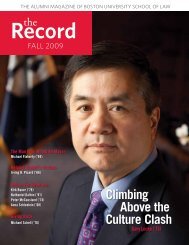the nature of representation: the cherokee right ... - Boston University
the nature of representation: the cherokee right ... - Boston University
the nature of representation: the cherokee right ... - Boston University
You also want an ePaper? Increase the reach of your titles
YUMPU automatically turns print PDFs into web optimized ePapers that Google loves.
128 PUBLIC INTEREST LAW JOURNAL [Vol. 15<br />
Cherokees most interested in obtaining <strong>representation</strong> in <strong>the</strong> House have been<br />
urging <strong>the</strong> narrow reading <strong>of</strong> <strong>the</strong> delegate promise. 181 Such a representative is a<br />
delegate with “a seat in <strong>the</strong> House <strong>of</strong> Representatives, with <strong>the</strong> <strong>right</strong> <strong>of</strong> debate, but<br />
not <strong>of</strong> voting.” 182<br />
The House created non-voting delegates “on <strong>the</strong> <strong>the</strong>ory that it might admit to<br />
<strong>the</strong> floor <strong>of</strong> debate merely anybody whom it might choose.” Over time, <strong>the</strong><br />
meanings and qualifications <strong>of</strong> <strong>the</strong> non-voting delegates grew more defined. 183 The<br />
<strong>right</strong>s and powers possessed by non-voting delegates are numerous and wide<br />
ranging:“[R]egular<strong>of</strong>ficespaceinHouse<strong>of</strong>ficebuildings...,[<strong>the</strong>]<strong>right</strong>tospeak<br />
on<strong>the</strong>floor<strong>of</strong><strong>the</strong>Houseaswellasinstandingcommittees...,[and<strong>the</strong>]<strong>right</strong>to<br />
vote in committee and in subcommittee.” 184 Congress can even grant delegates <strong>the</strong><br />
<strong>right</strong> to votes in <strong>the</strong> Committee <strong>of</strong> <strong>the</strong> Whole, where much <strong>of</strong> <strong>the</strong> house business is<br />
conducted, so long as <strong>the</strong> votes are not decisive through <strong>the</strong> operation <strong>of</strong> a “savings<br />
clause.” The Judicial branch upheld this <strong>right</strong> on review. 185<br />
Differences exist between non-voting delegates and full delegates both in terms <strong>of</strong><br />
<strong>the</strong> requirements for <strong>the</strong> individual representative and <strong>the</strong> <strong>nature</strong> <strong>of</strong> <strong>the</strong> population<br />
represented. The age, residency, and citizenship rules on full delegate qualifications<br />
do not explicitly apply to <strong>the</strong> non-voting delegates. 186 Never<strong>the</strong>less, “most recent<br />
a list <strong>of</strong> delegates and a description <strong>of</strong> <strong>the</strong>ir powers, See Michel v. Anderson, 817 F.<br />
Supp. 126 (D.D.C. 1993).<br />
181<br />
This was <strong>the</strong> conclusion <strong>of</strong> <strong>the</strong> participants at <strong>the</strong> Cherokee Delegate Strategic<br />
Planning Summit in Tahlequah, Oklahoma, Aug. 2002 (notes on file with <strong>the</strong> author).<br />
See, e.g., 137 Cong. Rec. H2464 (daily ed. Apr. 23, 1991) (statement <strong>of</strong> delegate Mr.<br />
Faleomavaega from <strong>the</strong> American Samoa) (“I submit, Mr. Speaker, that by establishing<br />
native American <strong>representation</strong> in Congress we could perhaps be salvaging <strong>the</strong> only<br />
promise ever made to <strong>the</strong> native Americans that can still be kept.”)<br />
182<br />
See Northwest Ordinance <strong>of</strong> 1787, 1789, 1 Stat. 50, 52 (creating <strong>the</strong> post <strong>of</strong><br />
territorial delegate); see e.g., 2 U.S.C. § 25(a) (2000) (wording <strong>of</strong> <strong>the</strong> power and<br />
qualifications for <strong>the</strong> District <strong>of</strong> Columbia delegate); Our American Government, H.R.<br />
Doc. No. 106-216, at 21 (2000) (“Delegates and Resident Commissioners may<br />
participateinHousedebatebut<strong>the</strong>yarenotpermittedtovoteon<strong>the</strong>floor. Allserveon<br />
committees<strong>of</strong> <strong>the</strong> House and possess powers and privileges equal to o<strong>the</strong>r Membersin committee, including <strong>the</strong> <strong>right</strong> to vote in committee.”)<br />
183<br />
Hinds, supra note 177, at I § 400.<br />
184<br />
Jamin B. Raskin, Is This America? The District <strong>of</strong> Columbia and <strong>the</strong> Right to<br />
Vote,34Harv.C.R.-C.L.L.Rev.39,82-83(1999). See also, 2DESCHLER’S PRECEDENTS<br />
OF THE HOUSE OF REPRESENTATIVES, supra note 180, at ch. 7 § 3, for a full account <strong>of</strong><br />
delegates’ authority and <strong>right</strong>s, including <strong>the</strong> <strong>right</strong> to an equal salary as members.<br />
185<br />
See Michel v. Anderson, 14 F.3d 623 (D.C. Cir. 1994) (aff’g Michel,817F.Supp.<br />
126).<br />
186<br />
Id. Each non-voting delegate is subject to individual eligibility qualifications.<br />
See 48 USCS § 1733 (2001). American Samoa qualifications: a person must be 25 years<br />
old, must “owe allegiance to <strong>the</strong> United States,” must be an inhabitant <strong>of</strong> American<br />
Samoa, and must not be not a candidate for o<strong>the</strong>r <strong>of</strong>fice. See, e.g., Hinds, supra note 177,<br />
I § 421 (stating that <strong>the</strong> laws <strong>of</strong> <strong>the</strong> United States do not impose qualifications for









